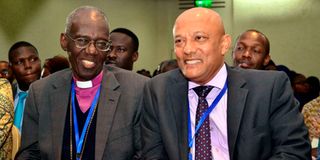EACC seeks to recover corruptly acquired assets worth Sh33bn

Ethics and Anti-Corruption Commission CEO Twalib Mbarak (right) and Commission Chairman Eliud Wabukala at a past event.
The Ethics and Anti-Corruption Commission is pursuing the forfeiture of corruptly acquired assets and unexplained wealth worth Sh33billion in courts across the country.
According to the anti-graft agency chairperson Archbishop (Rtd) Eliud Wabukala, the commission has also successfully concluded investigations into 501 high-impact cases on corruption and related offences, and 191 cases were finalised in court.
Speaking during the official launch of the Integrity Programme for the board of directors of the National Health Insurance Fund (NHIF) at a Naivasha hotel, he said the agency had taken a proactive approach in the fight against graft.
“The commission has averted a loss of approximately Sh32.5billion through proactive investigations and disruption of corruption networks,” said Dr Wabukala.
The essence of the proactive approach, he pointed out, was to help mitigate corruption and make Kenyans aware of their role in the fight against graft.
“The experience gathered by the commission in combating corruption reveals that corruption is primarily caused by negative culture, greed, conflict of interest and a dilapidated moral fabric,” noted the chairperson.
Information asymmetry
He reminded participants that health systems were particularly susceptible to corruption due to the large amounts of resources involved, information asymmetry, a large number of actors, system complexity, fragmentation and the “globalised” nature of the supply chain for drugs and medical devices.
Dr Wabukala said there was a need for continuous review of NHIF’s institutional integrity framework and organisational culture, hailing the programme as timely for the administrators and management.
NHIF board chairman Lewis Nguyai said they were taking proactive steps in the fight against graft instead of the usual knee-jerk- reactions. He added that the board had taken “deliberate” measures to fight corruption within itself.
“We have been in the past talking about fraud within the fund but we have managed to tighten the screws by continuously improving the ICT systems,” said Mr Nguyai.
He admitted that fraud was the most rampant form of corruption at the fund, saying they have managed to put up a centralised information system at the point of service delivery.
Mr Nguyai further revealed that they were in the process of recruiting new personnel who were “insurance inclined” and said the transformation was that of top-level directors.
“We want to get direct delivery officers like the caregivers, nurses and doctors, with 70 per cent being those with technical skills and 30 per cent with supportive skills,” said Mr Nguyai.
He said the workshop was aimed at instilling knowledge, and skills that will enable the fund to mainstream ethics, and integrity in its day-to-day leadership engagements as contemplated in law, regulations and policies.





